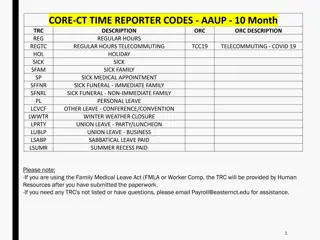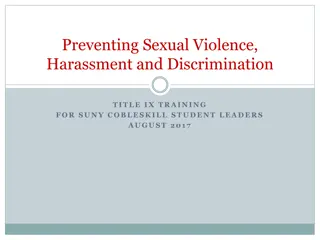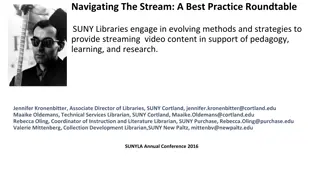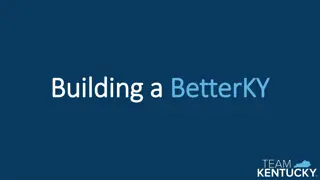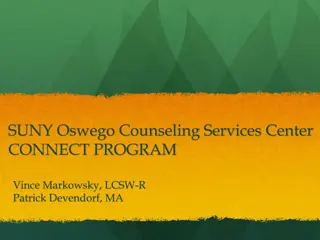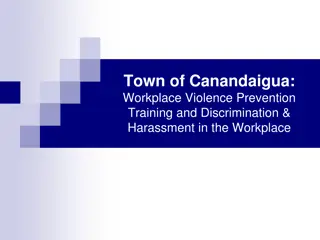SUNY Workplace Flexibility & Telecommuting Policy Overview
This policy allows for telecommuting arrangements based on operational needs, attracting a diverse workforce. Approval is subject to management's discretion, with applications evaluated individually. Employees must submit progress reports and follow guidelines for telecommuting. Denied applications can be appealed within a specified timeframe.
Download Presentation

Please find below an Image/Link to download the presentation.
The content on the website is provided AS IS for your information and personal use only. It may not be sold, licensed, or shared on other websites without obtaining consent from the author.If you encounter any issues during the download, it is possible that the publisher has removed the file from their server.
You are allowed to download the files provided on this website for personal or commercial use, subject to the condition that they are used lawfully. All files are the property of their respective owners.
The content on the website is provided AS IS for your information and personal use only. It may not be sold, licensed, or shared on other websites without obtaining consent from the author.
E N D
Presentation Transcript
The Mission To build professionalism, capacity, and competency of the workforce The Belief Change must come from and within the field The Strategy Developed workforce champions in all regions Increase provider engagement and collaboration Support organizational commitment to the DSP Core Competencies and Code of Ethics
Growth of the RCWT Team Region 2 Leads: Project Director: Kirsten Sanchirico New York Alliance Jennifer Vogt Dylan Brown Tish Comstock-Allcorn Region 3 Leads: Region 1 Leads: Rachel Jacob Chris Fortune Kenny Burr Erica Belois-Pacer Theresa Buick Melody Johnson Region 5 Leads: Denise Anghel Pam Wolff-Stackowitz Heather Thorgensen Lori LaRocco Doriann Adams Region 4 Leads: Sara Schacter-Erenburg Joanne Cropper Asheley Blaise Eliciana Caro Nicole Wan Ketrina Hazell Anthony Ismael
RCWT Shift to a Statewide Model Starting in April 2020, RCWT changed their regional approach to a virtual statewide model. All meetings, events, workshops and conferences are being held virtually and are available for every region to attend.
Percent of Stakeholder Groups Reached at RCWT Events in 2020 Trainers 14% FLS 35% 8% DSP's Self-Advocates 19% Program Managers 8% "Other" Positions 16%
Trainings/Presentations Provided During COVID-19 Staff Support Retention Leadership Other Trainings Cultural Competency: Avoiding Implicit Bias Culture of Appreciation Creating Safe Spaces Personal Stories The Language of Our Work Why Employment is Important for Everyone Person Centered Building a Resilient Trauma Informed Team Leadership in Communication Strategies for Employee Retention Emotional Intelligence for Emerging leaders The Why, What, and How of Credentialing Supporting Resiliency in Teams Grief Support All Staff are Teachers Talking About Turnover Share Your Successes and Challenges Core Competency Workshop for FLS
RCWT Provider Engagement In New York State there are currently 450 service providers. RCWT is reaching 100+ percent of all NYS providers.
A Plan for a Better Future! RCWT is leading a statewide effort to improve the quality of supports for people with ID/DD by transforming the DSP workforce! RCWT is using data to support DSP workforce development in NYS! RCWT is demonstrating a model of sustainability to other states!
Direct Support Direct Support Professional Professional CTE Pilot CTE Pilot BOCES BOCES Regional Centers for Workforce Transformation, Capital Region BOCES, NYS Office for People With Developmental Disabilities, and Provider Partners
A Groundbreaking Program A Groundbreaking Program Participants Learn and Earn: 6 Certificates Direct Support Professional, Nurse Assistant, Home Health Aide, Personal Care Aide, American Heart Association Basic Life Support/CPR and First Aid DSP portion of curriculum based on trainings required by state and federal guidelines for DSPs, the National Alliance for Direct Support Professionals (NADSP) Code of Ethics and the NYS DSP Core Competencies Pilot funding from NYS Workforce Development grant and the Regional Centers for Workforce Transformation.
Program Highlights The Direct Support Professional Program: Introduces the Direct Support Profession to new candidates Provides work-based learning opportunities to strengthen students hands-on skills and experience Established Mentor position supports students with learning about direct support and transition into the workforce Bolsters a career pathway students are eligible for job placement upon graduation
Why Career & Technical Education (CTE)? This pilot course is a win-win-win scenario, connecting New York's goals for Education, Advocacy and Economic Development to the core knowledge, skills and values of the profession. Coursework is aligned with both OPWDD-required training topics and industry fundamentals to ensure graduates share a commitment to best practices.
NOCTI Assessment NOCTI Assessment The New York Alliance for Inclusion and Innovation and OPWDD have hired a nationally recognized entity, NOCTI, to build a standardized CTE course certificate for graduates of the program. Once the assessment is finalized, participants will receive the Direct Support Professional Certificate the first DSP standardized CTE certificate in New York State which can be used by any school to assess the skills, knowledge and competency of learners.
Scope and Sequence Health Careers Sequence: Two-Year Option for High School Students or 15-week program for Adult Learners Year One: Certified Nurse Assistant (CNA) Year Two: DSP/ Home Health Aide (HHA)/ Personal Care Aide (PCA) Job Candidate Knows: NYS Core Competencies NADSP Code of Ethics PRAISE Overview of Services System Community Inclusion Human Sexuality Communication Positive Approaches Learn person- centered care through training in the classroom and off-campus Learn person- centered supports through training and classroom prep Complete 108 hours of work-based learning on site Complete 108 hours of clinical work in a nursing home Learn to assist people who may need supports living within the community Prepare to take the Certified Nurse Assistant Prometric exam for NYS
Direct Support Turnover Direct Support Turnover The Direct Support Professional annual turnover rate in New York State is about 36.2% (National Core Indicators, 2020). Turnover Costs Turnover Solutions The costs and wasted resources associated with high DSP turnover have resulted in service providers not finding enough qualified individuals to fill positions (University of Minnesota, 2018). A study found provider organizations that participated in a competency-based training and certification program had a 16% decrease in turnover rates (University of Minnesota, 2017). Research indicates direct support turnover can have a tremendous financial burden on service providers; hinder the community integration of people with I/DD; and prevent people from accessing their communities (Friedman, 2020). Research indicates mentorship is effective at decreasing turnover (Larson & Hewitt, 2004; Micke, 2015).
Research Supports Certification Research Supports Certification Certificate programs provide a higher and consistent standard for direct support work performance and improve the skills of DSPs (University of Minnesota, 2017). Individuals who received services from certified DSPs experienced improvement in outcomes such as employment, social relationships, inclusion, and health and safety (University of Minnesota, 2017). Research indicates attainment of certifications improves the quality of care, contributes to higher levels of professionalism, improves job satisfaction, and reduces injuries for DSPs and the people they support (Report to the President, 2017).
BOCES Pilot Project Benefits BOCES Pilot Project Benefits Builds student pathway to the direct support workforce Enhances the direct support occupational image and profile with a state recognized Certificate Program Strengthens the candidate pool of qualified and motivated workers Improves recruitment and retention efforts for this workforce Work-based learning and mentorship provides participants with hands- on knowledge and experience, preparing them to enter the workforce Participants learn the relevant skills of the direct care occupations, expected to increase by 52% in New York State, from 2018 to 2028.
Future Goals Future Goals Build and support a sustainable Capital Region BOCES program that can be replicated in other regions of the state. Strengthen the candidate pool and career pathway to address workforce shortages in the developmental disabilities field. Further establish the Direct Support Professional title as distinct from health care certifications, while introducing and promoting the I/DD field for career opportunities.








